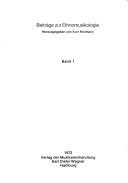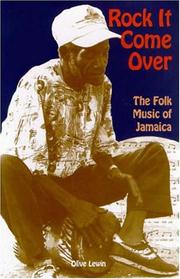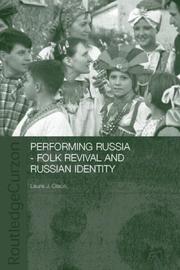| Listing 1 - 10 of 125 | << page >> |
Sort by
|
Book
ISBN: 3873205807 Year: 1988 Volume: vol 80 Publisher: Baden-Baden Koerner
Abstract | Keywords | Export | Availability | Bookmark
 Loading...
Loading...Choose an application
- Reference Manager
- EndNote
- RefWorks (Direct export to RefWorks)
muziekgeschiedenis --- Music --- etnomusicologie --- Azerbaijan --- Folk music --- -Ethnic music --- Traditional music --- Folklore --- History and criticism --- -History and criticism --- Ethnic music --- 78.33.2

ISBN: 3921029074 Year: 1972 Publisher: Hamburg Karl Dieter
Abstract | Keywords | Export | Availability | Bookmark
 Loading...
Loading...Choose an application
- Reference Manager
- EndNote
- RefWorks (Direct export to RefWorks)
Folk music --- History and criticism. --- Ethnic music --- Traditional music --- History and criticism --- Folklore --- Music

ISBN: 0815334737 Year: 1999 Publisher: New York ; London Garland
Abstract | Keywords | Export | Availability | Bookmark
 Loading...
Loading...Choose an application
- Reference Manager
- EndNote
- RefWorks (Direct export to RefWorks)
Music --- Africa --- History and criticism --- 78.32.0 --- Folk music --- Ethnic music --- Traditional music --- Folklore
Book
ISBN: 0252080122 0252096428 9780252096426 9780252038518 9780252080128 1322089892 9781322089898 0252038517 9780252038518 9780252080128 Year: 2014 Publisher: Urbana
Abstract | Keywords | Export | Availability | Bookmark
 Loading...
Loading...Choose an application
- Reference Manager
- EndNote
- RefWorks (Direct export to RefWorks)
In 'Roots of the Revival', Ronald D. Cohen and Rachel Clare Donaldson present a transatlantic history of folk's mid-century resurgence that juxtaposes the related but distinct revivals that took place in the United States and Great Britain.
Folk music --- Ethnic music --- Traditional music --- Folklore --- Music --- History and criticism.

ISBN: 9789766400286 9781435694804 1435694805 9766400288 Year: 2000 Publisher: Kingston, Jamaica University of the West Indies Press
Abstract | Keywords | Export | Availability | Bookmark
 Loading...
Loading...Choose an application
- Reference Manager
- EndNote
- RefWorks (Direct export to RefWorks)
Folk music --- Kumina (Cult) --- Cults --- Ethnic music --- Traditional music --- Folklore --- Music --- History and criticism. --- African influences.
Book
ISBN: 1351542087 1351542079 1315085763 1282243403 9786612243400 075469383X 9780754693833 0754662306 9780754662303 9780754662303 9781282243408 9781315085760 9781351542067 9781409419204 9781351542081 9781351542074 6612243406 Year: 2009 Publisher: Farnham, Surrey, England ; Burlington, VT : Ashgate,
Abstract | Keywords | Export | Availability | Bookmark
 Loading...
Loading...Choose an application
- Reference Manager
- EndNote
- RefWorks (Direct export to RefWorks)
"For at least two centuries, and arguably much longer, Ireland has exerted an important influence on the development of the traditional, popular and art musics of other regions, and in particular those of Britain and the United States. During the past decade or so, the traditional musics of the so-called Celtic regions have become a focus of international interest. The phenomenal success of shows such as Riverdance (which appeared in 1995, spawned from a 1994 Eurovision Song Contest interval act) brought Irish music and dance to a global audience and played a part in the further commoditization of Irish culture, including traditional music. However, there has been until now, relatively little serious musicological study of the traditional music of Northern Ireland. Northern Ireland remains a divided community in which traditional culture, in all its manifestations, is widely understood as a marker of religious affiliation and ethnic identity. Since the outbreak of the most recent 'troubles' around 1968, the borders between the communities have often been marked by music. For example, many in the Catholic, nationalist community, regard the music of Orange flute bands and Lambeg drums as a source of intimidation. Equally, many in the Protestant community have distanced themselves from Irish music as coming from a different ethnic tradition, and some have rejected tunes, styles and even instruments because of their association with the Catholic community and the Irish Republic. Of course, during the same period many other Protestants and Catholics have continued to perform in an apolitical context and often together, what in earlier times would simply have been regarded as folk or country music. With the increasing espousal of a discrete Ulster Scots tradition since the signing of the Belfast (or 'Good Friday') Agreement in 1998, the characteristics of the traditional music performed in Northern Ireland, and the place of Protestant musicians within popular Irish cult"--Provided by publisher.
Folk music --- Irish Americans --- Ethnology --- Irish --- Ethnic music --- Traditional music --- Folklore --- Music --- History and criticism.
Book
ISBN: 0813147670 9780813147673 9780813120805 9780813193267 0813133564 9780813133560 Year: 2009 Publisher: Lexington, Kentucky
Abstract | Keywords | Export | Availability | Bookmark
 Loading...
Loading...Choose an application
- Reference Manager
- EndNote
- RefWorks (Direct export to RefWorks)
Play of a Fiddle gives voice to people who steadfastly hold to and build on the folk traditions of their ancestors. While encountering the influences of an increasingly overwhelming popular culture, the men and women in this book follow age-old patterns of folklife and custom, making their own music and dance in celebration of them. Shedding new light on a region that maintains ties to the cultural identities of its earliest European and African inhabitants, Gerald Milnes shows how folk music in West Virginia borrowed rhythmic, melodic, and vocal forms from the Celtic, Anglo, Germanic, and Af
Folk music --- Ethnic music --- Traditional music --- Folklore --- Music --- History and criticism.

ISBN: 0203389891 1134341083 1280025190 0203317572 9780203317570 0415326141 9781134341078 1134341075 9780415406178 9781134341030 9781134341085 9780415326148 Year: 2004 Publisher: London New York RoutledgeCurzon
Abstract | Keywords | Export | Availability | Bookmark
 Loading...
Loading...Choose an application
- Reference Manager
- EndNote
- RefWorks (Direct export to RefWorks)
This book examines folk music and dance revival movements in Russia, exploring why this folk culture has come to represent Russia, how it has been approached and produced, and why memory and tradition, in these particular forms, have taken on particular significance in different periods. Above all it shows how folk ""tradition"" in Russia is an artificial cultural construct, which is periodically reinvented, and it demonstrates in particular how the ""folk revival"" has played a key role in strengthening Russian national consciousness in the post-Soviet period.
Folk music --- Ethnic music --- Traditional music --- Folklore --- Music --- History and criticism. --- Social aspects
Book
ISBN: 0810884895 9780810884892 129955394X 9781299553941 9780810884885 0810884887 Year: 2013 Publisher: Lanham, Md.
Abstract | Keywords | Export | Availability | Bookmark
 Loading...
Loading...Choose an application
- Reference Manager
- EndNote
- RefWorks (Direct export to RefWorks)
In African American Folksong and American Cultural Politics: The Lawrence Gellert Story, scholar and musician Bruce Conforth tells the story of one of the most unusual collections of African American folk music ever amassed-and the remarkable story of the man who produced it: Lawrence Gellert.
African Americans --- Folk music --- Ethnic music --- Traditional music --- Folklore --- Music --- History and criticism. --- History --- Gellert, Lawrence,
Book
ISBN: 0228000149 9780228000143 9780228000150 9780773558809 0773558802 9780773558793 0773558799 0228000157 Year: 2019 Publisher: Montreal : McGill-Queen's University Press,
Abstract | Keywords | Export | Availability | Bookmark
 Loading...
Loading...Choose an application
- Reference Manager
- EndNote
- RefWorks (Direct export to RefWorks)
"Music and dance in Canada today are diverse and expansive, reflecting histories of travel, exchange and interpretation, and challenging conceptions of expressive culture that are bounded and static. Reflecting current trends in ethnomusicology, Contemporary Musical Expressions in Canada examines cultural continuity, disjuncture, intersection, and interplay in music and dance across the country. Essays reconsider conceptual frameworks through which cultural forms are viewed, critique policies meant to encourage crosscultural sharing, and address ways in which traditional forms of expression have changed to reflect new contexts and audiences. From North Indian kathak dance, Chinese lion dance, early Toronto hip hop, and contemporary cantor practices within the Byzantine Ukrainian Church in Canada to folk music performances in twentieth-century Quebec, Gaelic milling songs in Cape Breton, and Mennonite songs in rural Manitoba, this collection offers detailed portraits of contemporary music practices and how they engage with diverse cultural expressions and identities. At a historical moment when identity politics, multiculturalism, diversity, immigration, and border crossings are debated around the world, Contemporary Musical Expressions in Canada demonstrates the many ways that music and dance practices in Canada engage with these broader global processes."--
Folk music --- Ethnic music --- Traditional music --- Folklore --- Music --- History and criticism.
| Listing 1 - 10 of 125 | << page >> |
Sort by
|

 Search
Search Feedback
Feedback About UniCat
About UniCat  Help
Help News
News